Naxos Town: The Gorgeous Historic Heart of the Cyclades
In this destination guide, we will visit the sights, taverns and restaurants of Naxos Town.
Naxos
The island of Naxos is by far the biggest island of the Cyclades – and perhaps also the most diverse of the entire archipelago.
Naxos has some great beaches, packs a lot of history and culture, and even has some high mountains.
At 1,004 metres high (3,294 feet), Mount Zeus (called Mount Zas by the locals) is the highest peak of the island.
When hiking in the island’s rugged interior it is even possible to completely forget that you are on an island altogether.
There is a lot to see and do on Naxos – you could easily fill a week on the island.
Given that I’ve visited the island before and this time only added a day on the island as transit stop before taking the ferry to nearby Astypalaia, I would however focus all my attention to Naxos Town.
Naxos Town, or Chora Naxos in Greek, is the island’s capital and requires at least a full day to do it justice.
It has the beauty of a typical Cycladic town, interesting historical sights and vibrant taverns and nightlife.

Harbour
Most visitors to Naxos Town will arrive at the port, located right in the centre of the old town.
From here, all sights, shops and restaurants are just a short walk away.
Given that there are lots of parking places at the port and that the KTEL bus station is located just across the harbour square, it is also the location where most day trippers arrive when they come by car or bus from their accommodation in another town on the island.
The harbour thus makes for a convenient point to start your sightseeing tour of Naxos Town.
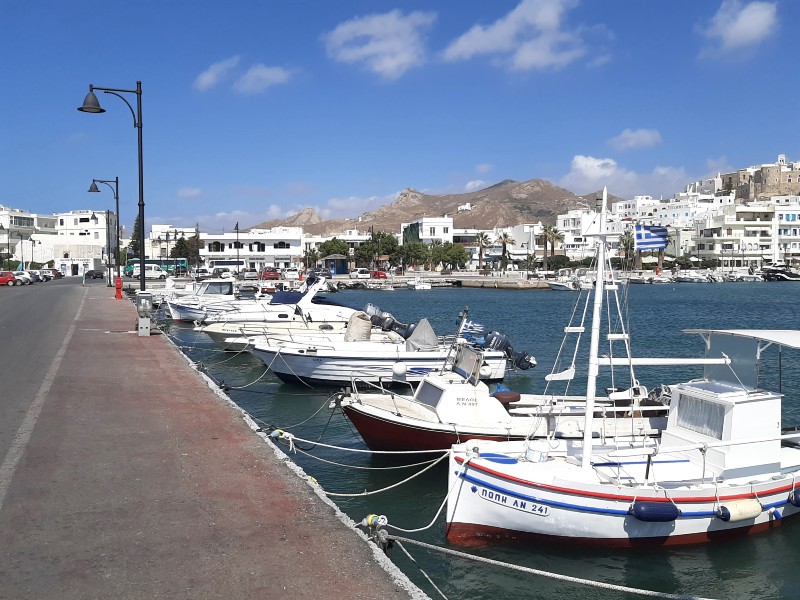

Portara
One of the most eye-catching sights of Naxos Town is the Portara, or Great Door.
It is a huge marble gate from the year 500 BC which used to be part of a Temple of Apollo, although it was never finished.
The marble entrance gate is all that’s left nowadays and it stands solemnly on the small islet of Palatia, which is located right at the entrance of the Port of Naxos.
The islet is connected to Naxos Town by a short causeway.
If it’s windy, do watch out for the waves when walking over to Palatia, unless you want to get wet or be swept into the sea that is!

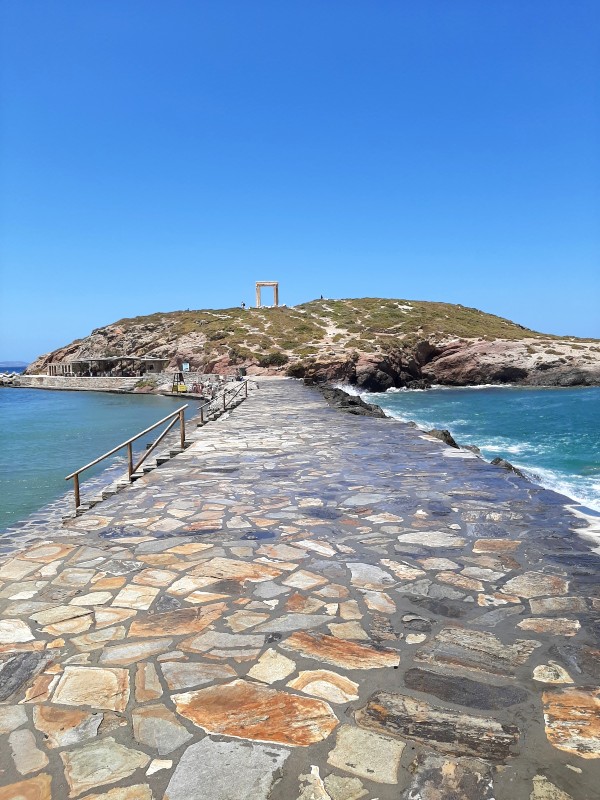
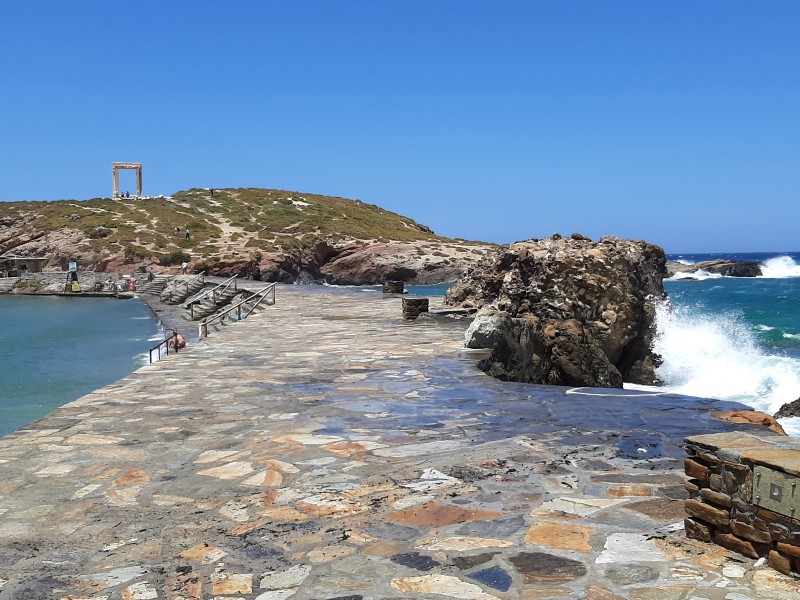

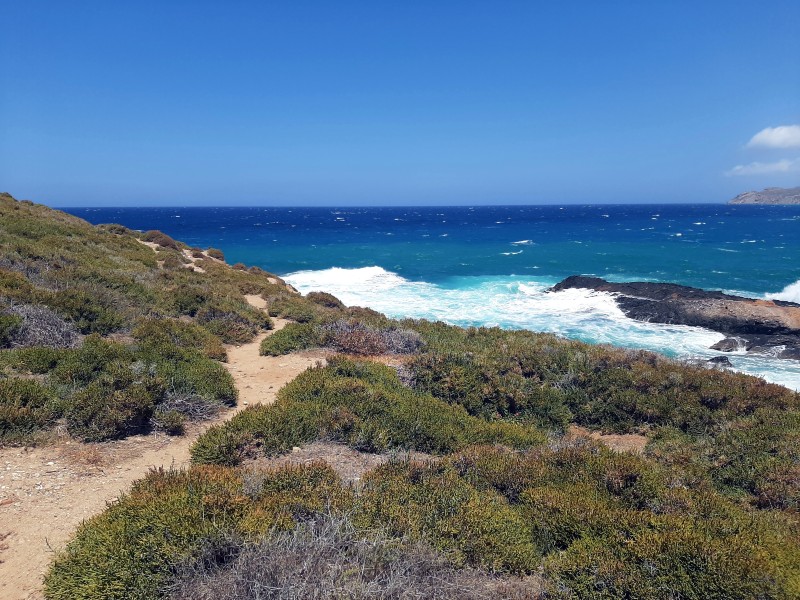

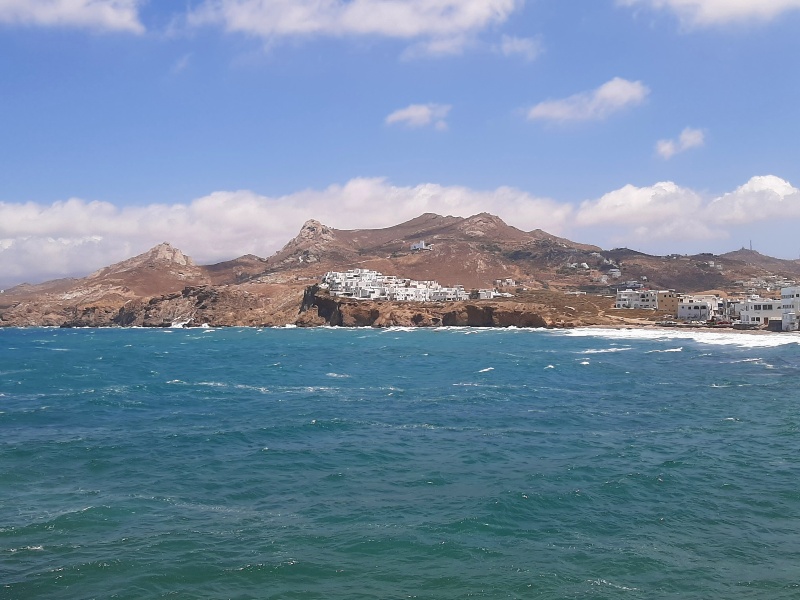
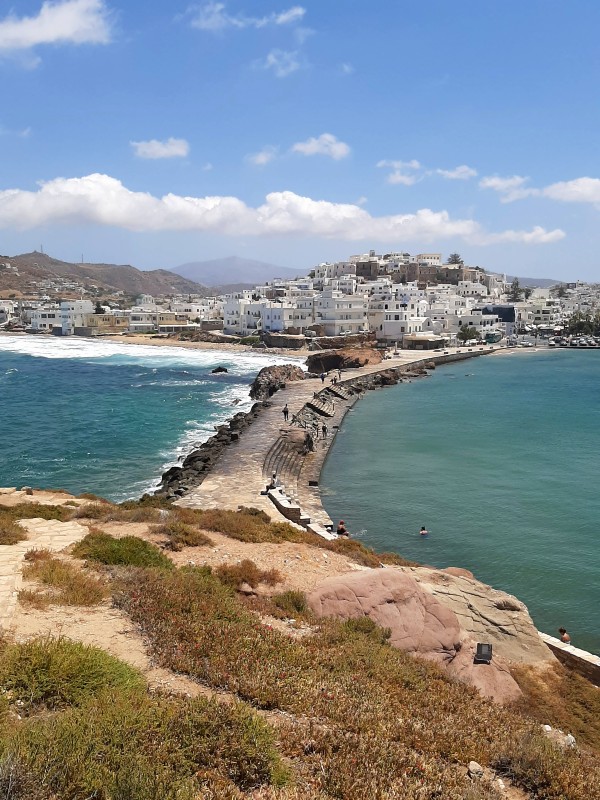

Waterfront
Back on Naxos, I was getting hungry as it was about time to have some lunch.
Fortunately, there were plenty of taverns and restaurants to choose from.
Although there are quite some appealing taverns hidden in the backstreets of Naxos Town, most of the city’s pubs and restaurants are located right at the waterfront or in the streets shortly behind.
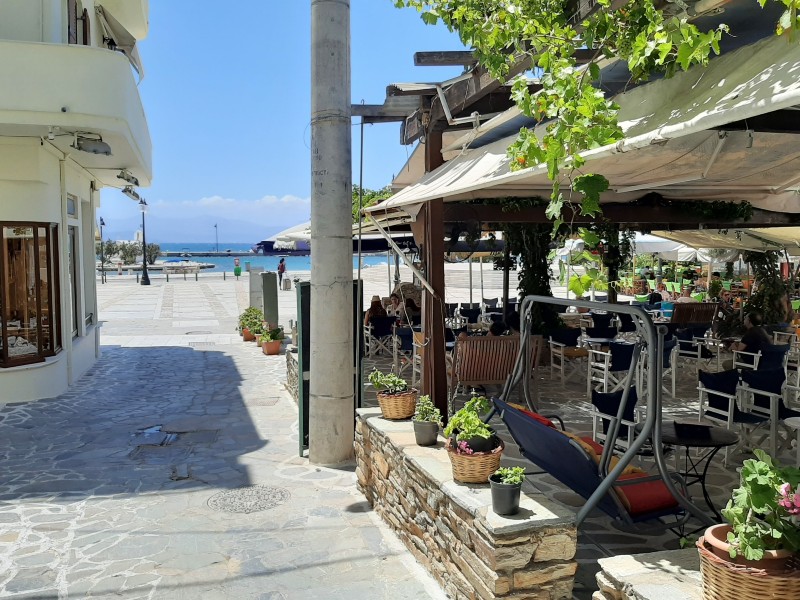
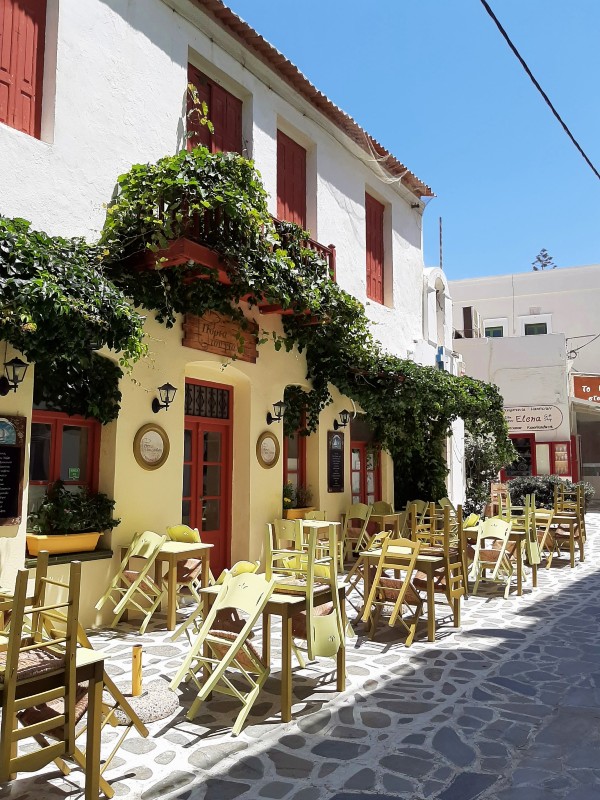

Sto Ladoxarto
Based on online reviews, I settled for a taverna called Sto Ladoxarto.
It turned out to be an absolute home run and was certainly among the best restaurants during this entire summer holiday.
The tavern was beautifully decorated and had great views from its large windows over the waterfront and the marina.
Despite it being lunchtime, the tavern was however completely empty – as were many of the other restaurants on the waterfront.
You could clearly see that the amount of tourists in town was nothing compared to a normal Naxian summer due to the corona pandemic.
Sto Ladoxarto is well known for its delicious grilled meats.
I therefore ordered the “kontosouvli” – or spit roasted BBQ pork.
It was beautifully presented on a wooden board and was served with roasted tomatoes with yoghurt sauce, a pita bread and some chips.
Everything was absolutely delicious and tasted fresh, juicy and authentic.
If you visit Naxos Town, I can highly recommend Sto Ladoxarto. If I would revisit Naxos in the future, I’d return to the restaurant in a heartbeat.
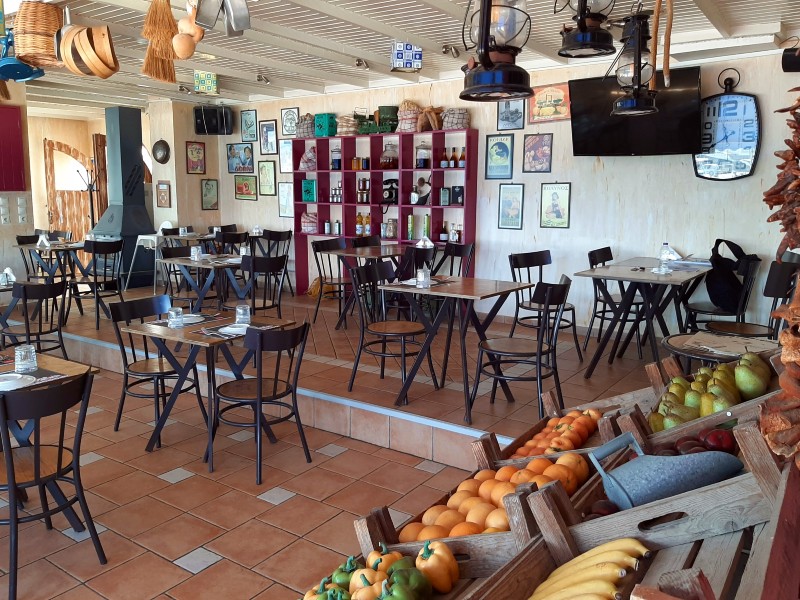
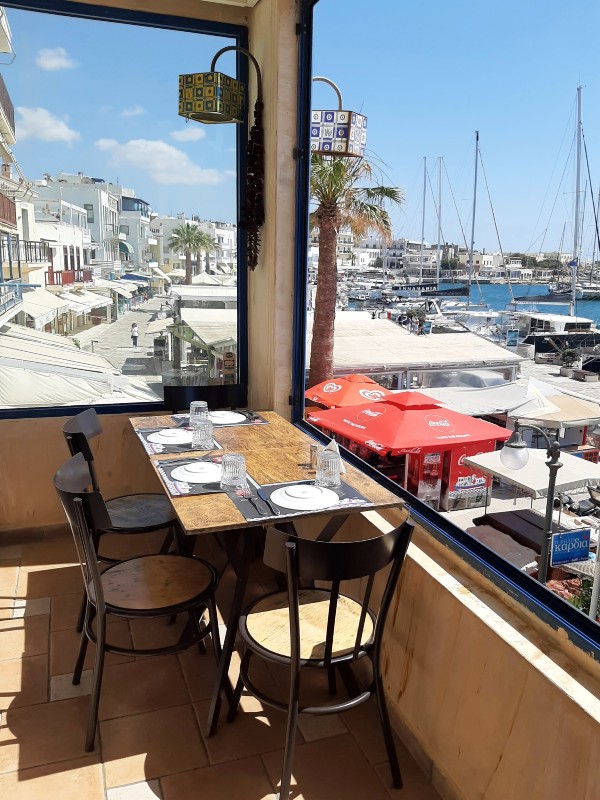

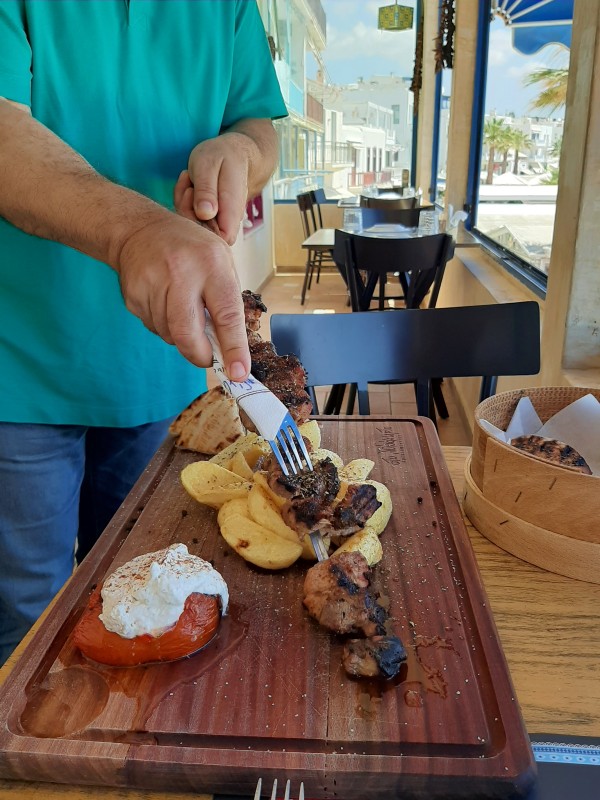
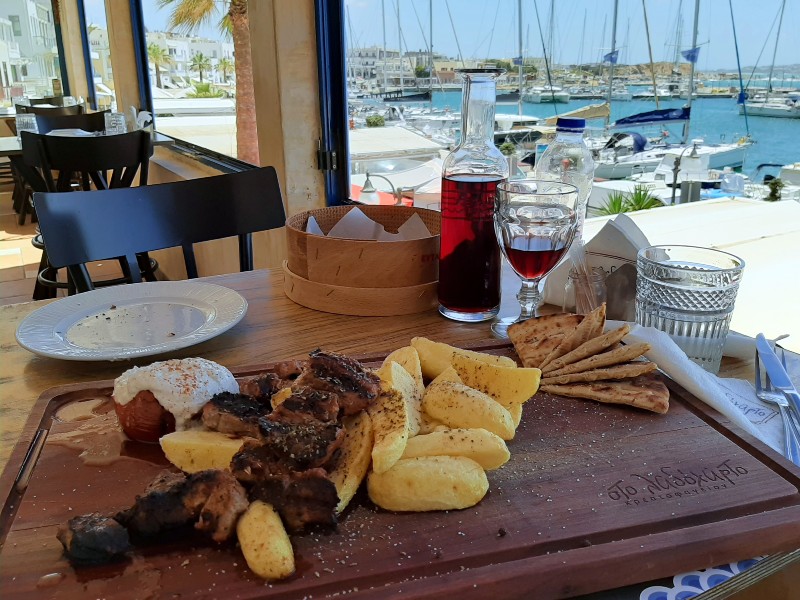
Grotta Beach
After the excellent lunch I continued my tour of Naxos Town, first heading to the northern shore.
The name of the beach is derived from the Italian word ‘grotta’, which means cave.
It was also the location where an ancient Mycenaean city once stood, which at the time was perhaps the most important town of all the Cyclades.
Today, Grotta beach feels delightfully derelict at some places, with abandoned buildings taking a battering from the fierce meltemi winds, the fierce northern winds which are dominant in the Aegean Sea in the summer months.
Because of the strong winds, Grotta Beach is not really suitable for a swim, although it does make for a highly picturesque walk.
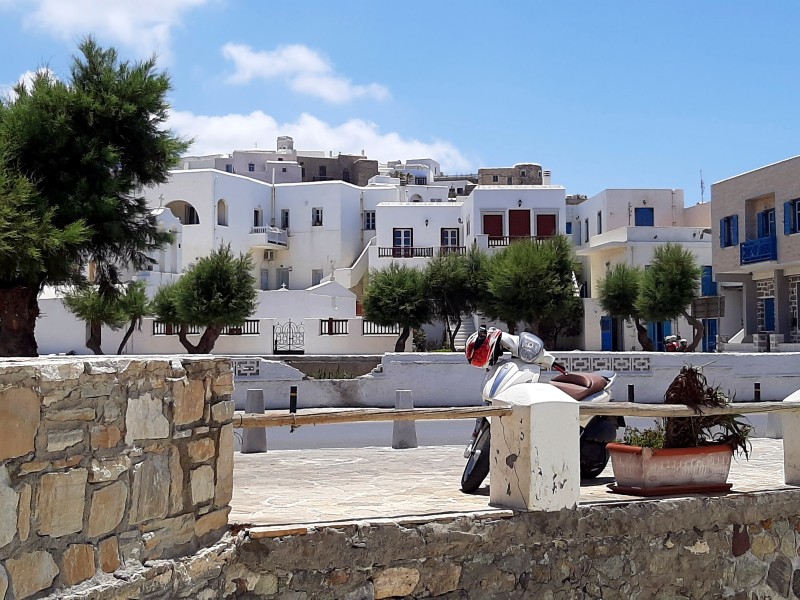
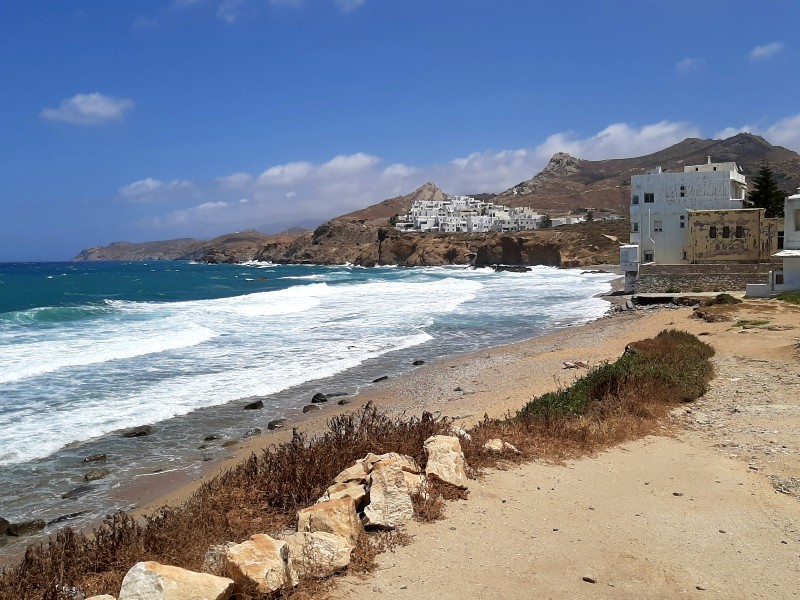
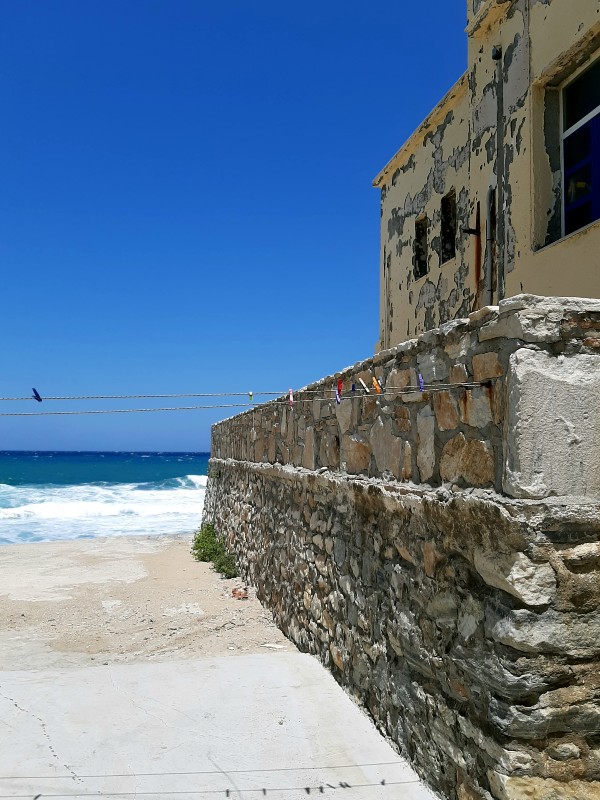

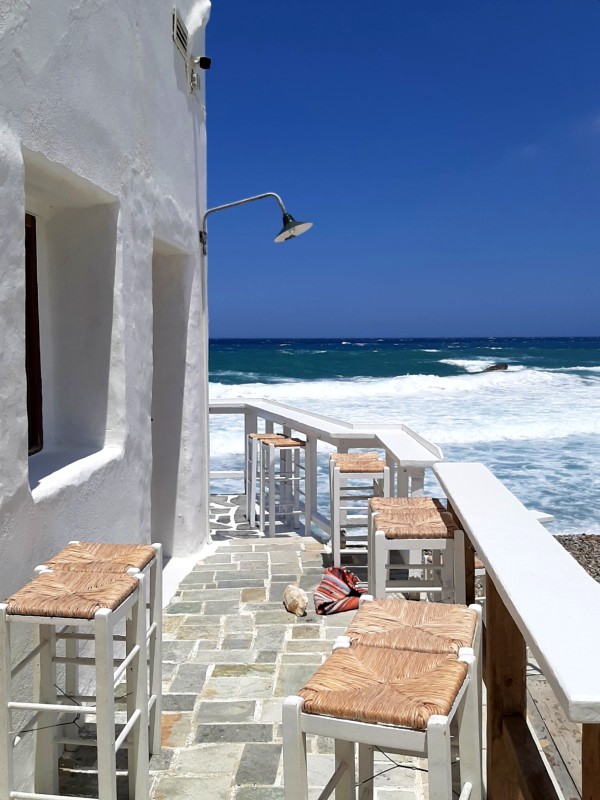
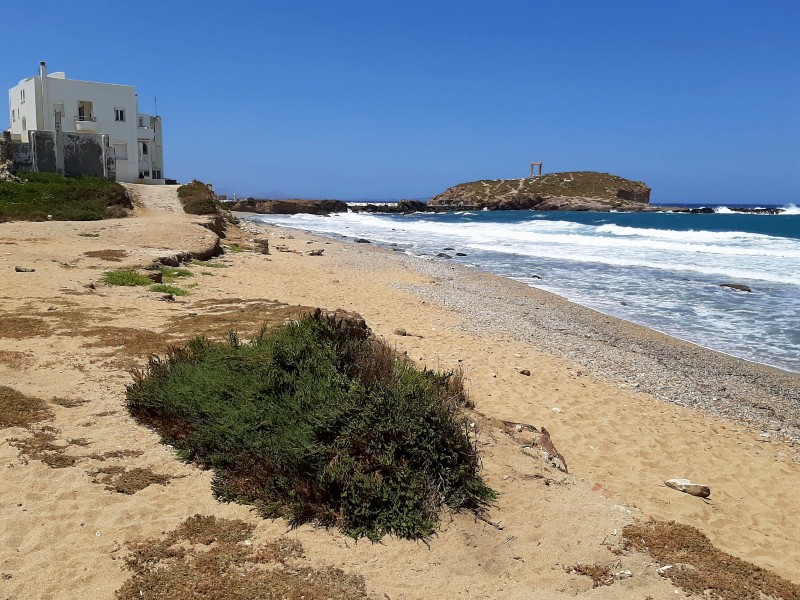

Orthodox Cathedral
If you walk away from Grotta Beach across the coastal road, you will find yourself in front of the Orthodox Cathedral of Naxos.
This large whitewashed church, whose official name is the Metropolitan Church of Zoodochos Pigi, was built at the end of the 18th Century to replace a smaller church.
At the large square in front of the Cathedral you can find two other, smaller churches which are well worth a quick visit.

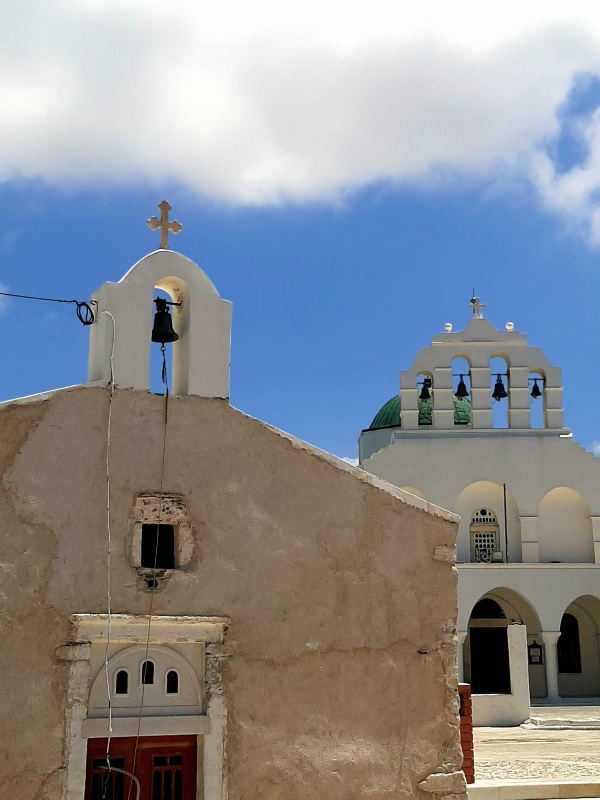
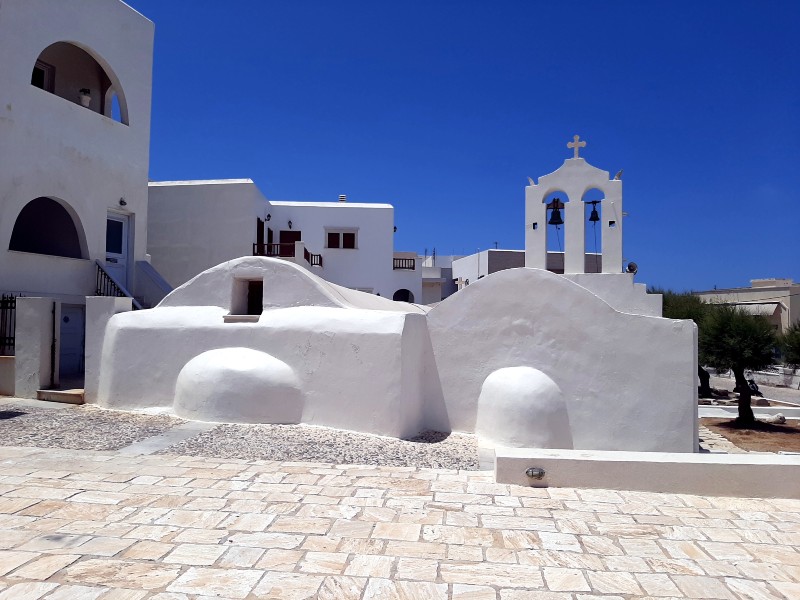
Kastro
In my opinion, the best of Naxos Town is not found at the waterfront but in the backstreets of the old town.
The further you walk away from the sea, the narrower the streets become and the more delightful the town gets.
Naxos Town is at its absolute best when exploring these streets at random without a map to guide you.
Just follow your eyes and nose and get lost in the maze-like streets running up to the hill.
The lower area of the old town is called Bourgos and is the place where the Greeks used to live in Medieval times.
The highest point of the old town is called the Kastro (castle).
This “castle” is actually more like a walled, hilltop town on its own and was constructed by the Venetians.
Led by Marco Sanudo, the Venetians had conquered the island from the Byzantine Empire in the aftermath of the Fourth Crusade in 1207.
Sanudo established a duchy in the Aegean Sea and made Chora Naxos its capital.
The Venetian rulers and the local Roman Catholic population lived together in the safety and shelter of the Kastro walls, divided from the Orthodox Greeks in the Bourgos area down below.
You can easily spot the old walls, entrance gates and small passages linking Bourgos with the Kastro.
The centrepiece of the Kastro is the Roman Catholic Cathedral which dates back to the 13th Century, although much of the present-day building is a 16th Century restoration paid for by the wealthy Catholic merchants and traders of Naxos.

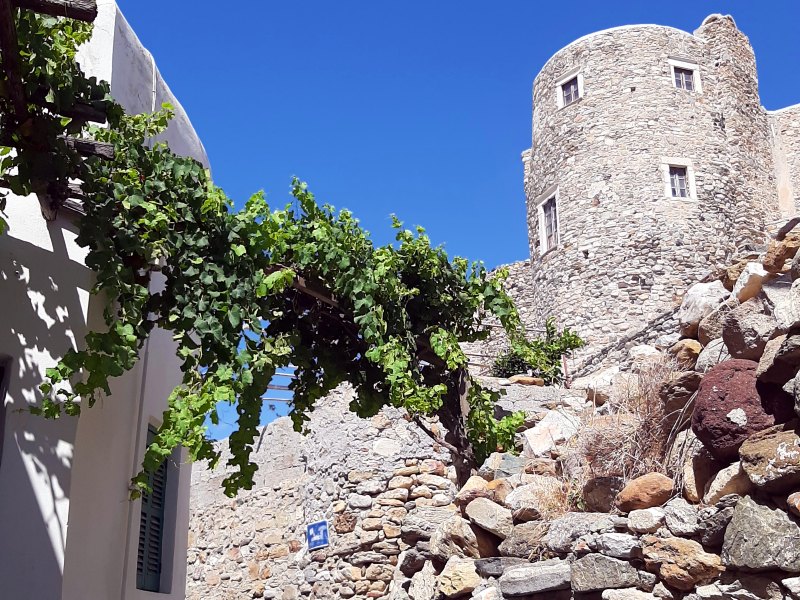


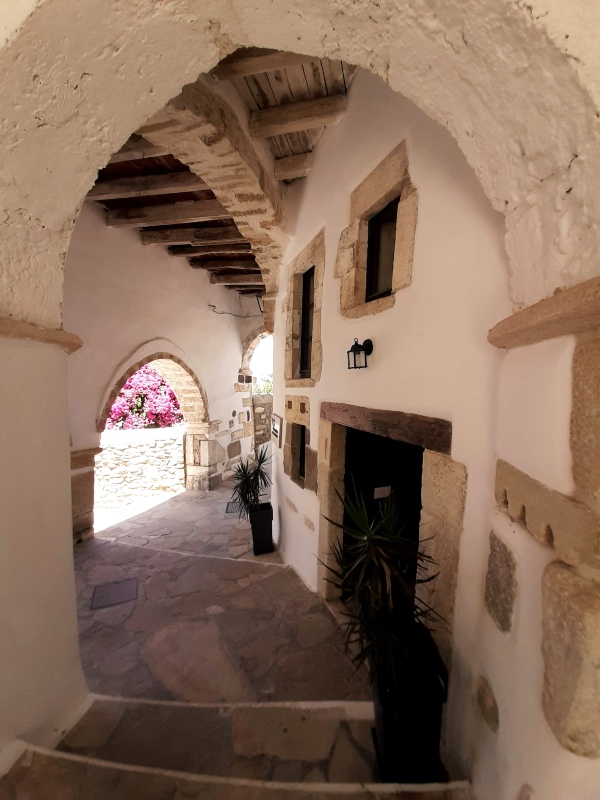
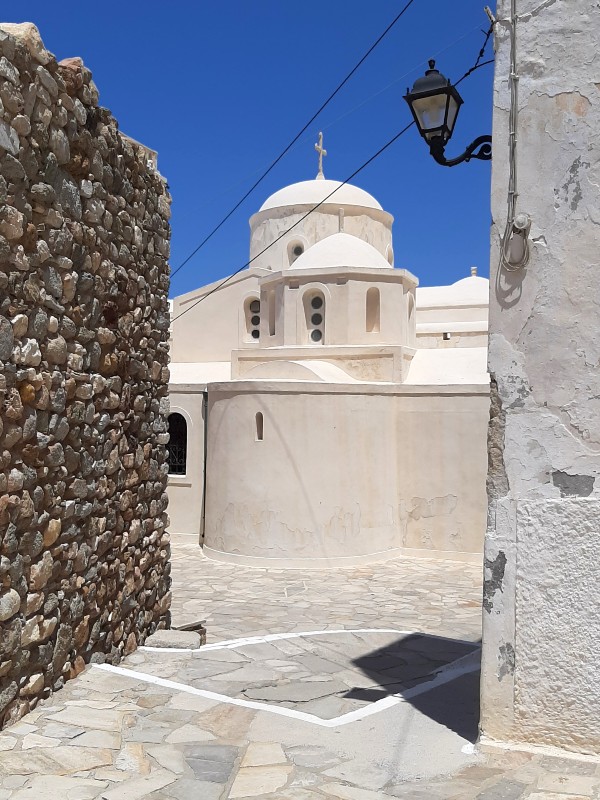


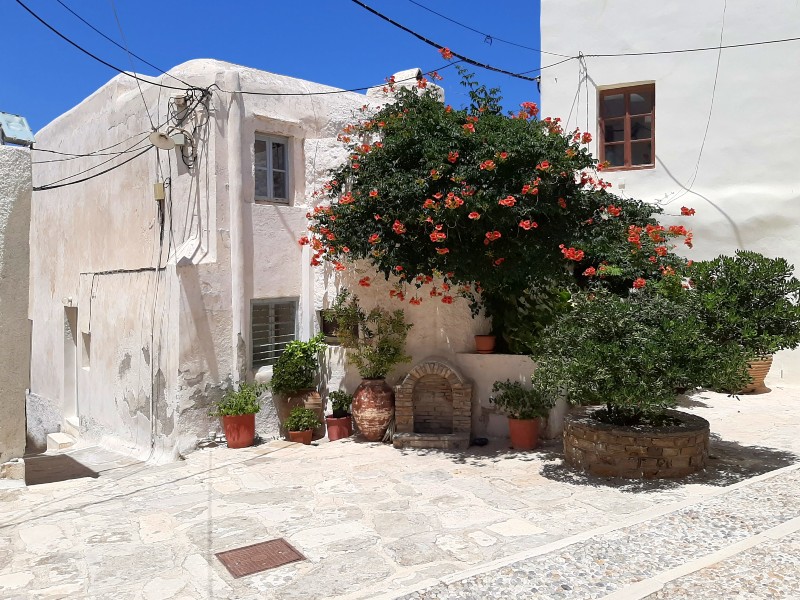
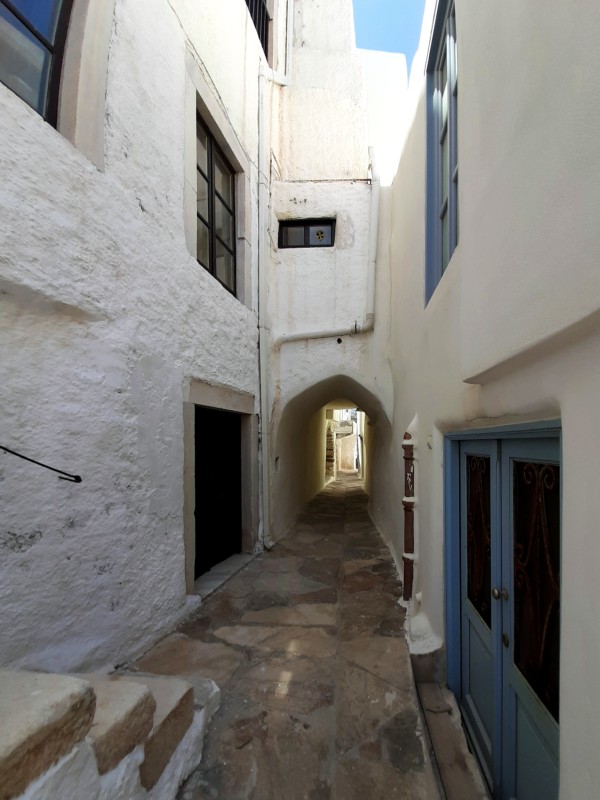

Coffee time
When in Greece, it is a must to make frequent coffee stops. The country has such an appealing coffee culture, and it is understandable why.
There is some great quality (iced) coffee and frappe available, and many of the cafes so highly appealing that you just want to linger around for a while, taking a sip at a time while having a chat, reading a book, or simply absorbing the surroundings.
One of my favourite places in Naxos for a drink is Honey & Cinnamon (Meli Kanela in Greek).
Located just south of the Kastro, it has outdoor seating on a garden-like square.
The café doubles as a lively cocktail bar at night and has a great vibe and cosy setting no matter the time of the day you visit.


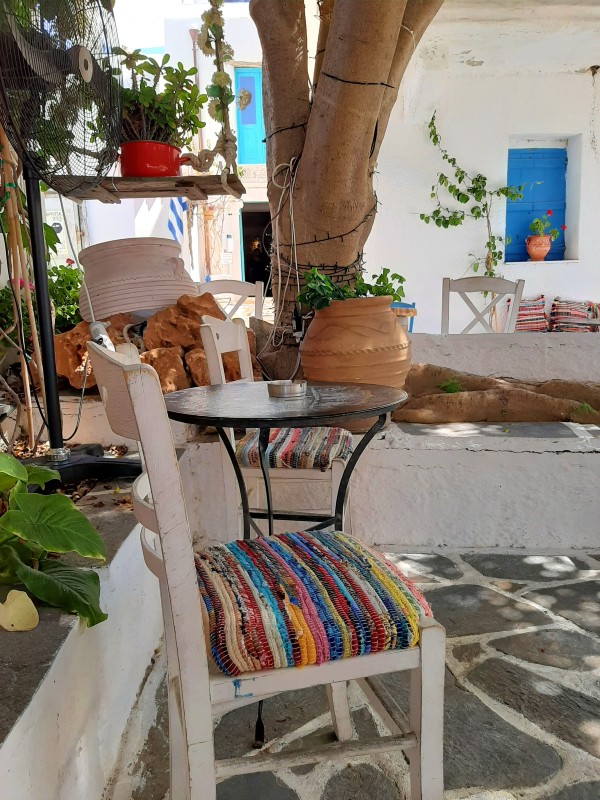


Backstreets
After the coffee it was time to explore more of Naxos Town.
The small streets and steps leading down from the Kastro to the harbour make for some scenic views over Naxos Town and the deep blue waters of the Aegean.
The area is dotted with small Orthodox churches and chapels as well as gorgeous bougainvillea planted next to the whitewashed houses.
Even though the area might not have any blockbuster sights, these old town backstreets do make for an appealing area to wander around.
Especially the streets to the north of Kastro towards Bourgos are highly scenic.
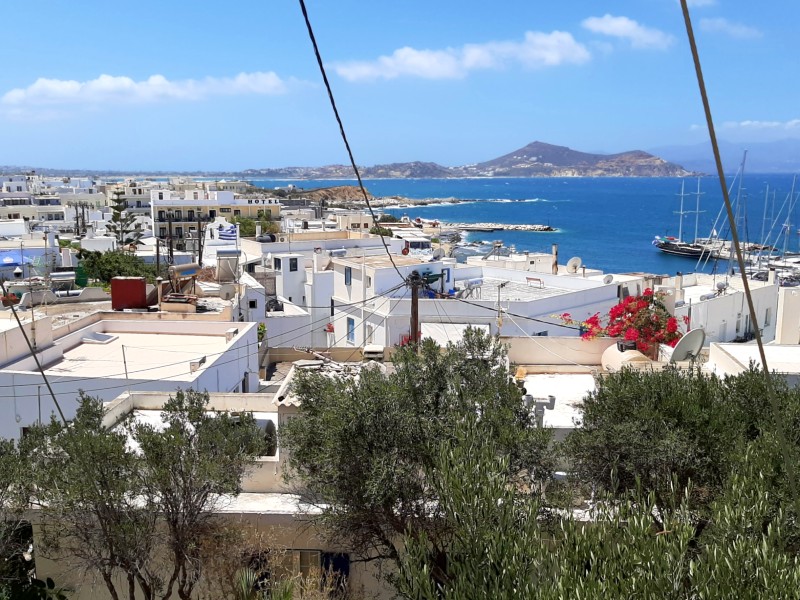



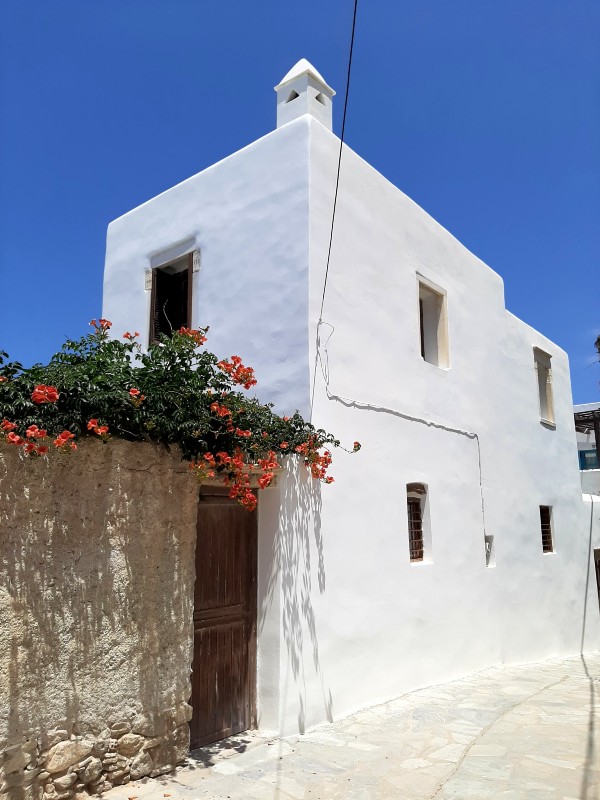

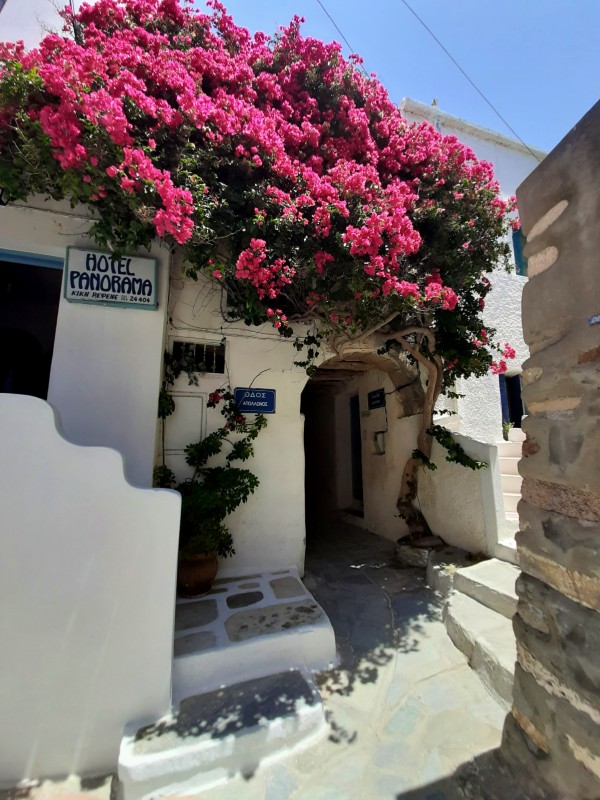
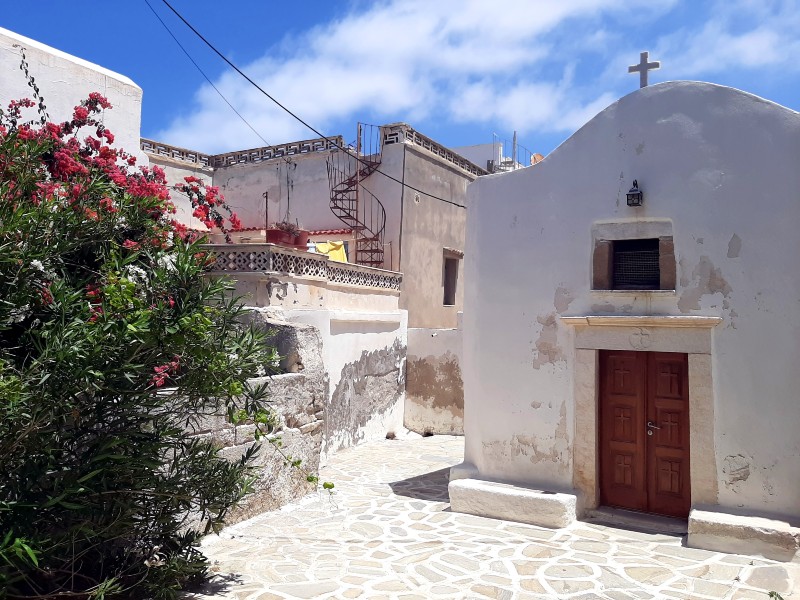
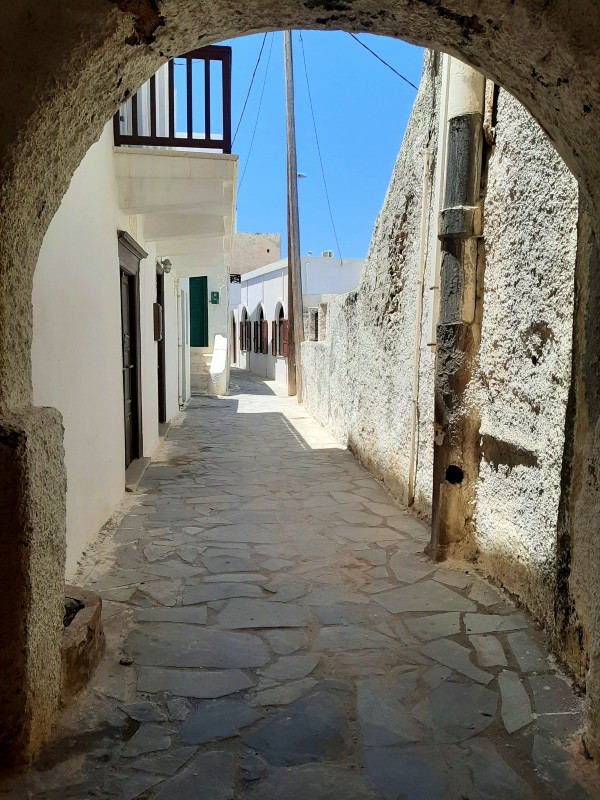
Bourgos
The area to the north and north-west of the hilltop Kastro is called Bourgos and was the place where the Greeks used to live in Medieval times.
Nowadays, the streets in these northern and north-western part of Naxos Town are full of appealing bars and taverns.
Compared to those on the waterfront, the restaurants here are a bit more small-scale and intimate, with seats spread out through the narrow streets.
Although there are quite a few boutique stores and souvenir shops in the streets of Bourgos, they are not door-to-door which means the neighbourhood still has retained its authentic character.
Closer to the waterfront, there is even a small grocery store and bookshop which seemed to cater mostly towards locals.
That said, if you have a self-catering apartment or simply look for the usual high street shops, services and large supermarkets, you should head to the area directly south of the old town.
Most shops you need are located on Sokratous Papavasiliou street – the main artery leading to the south-east out of Naxos Town.
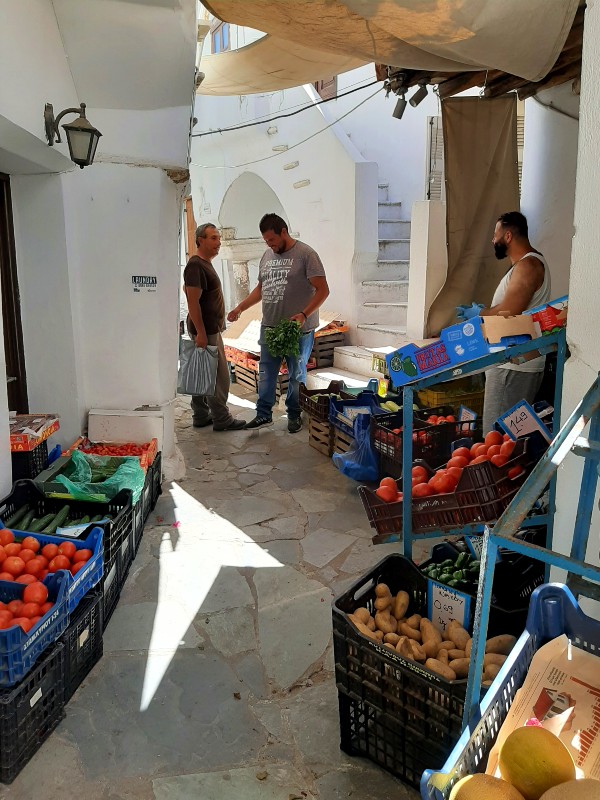
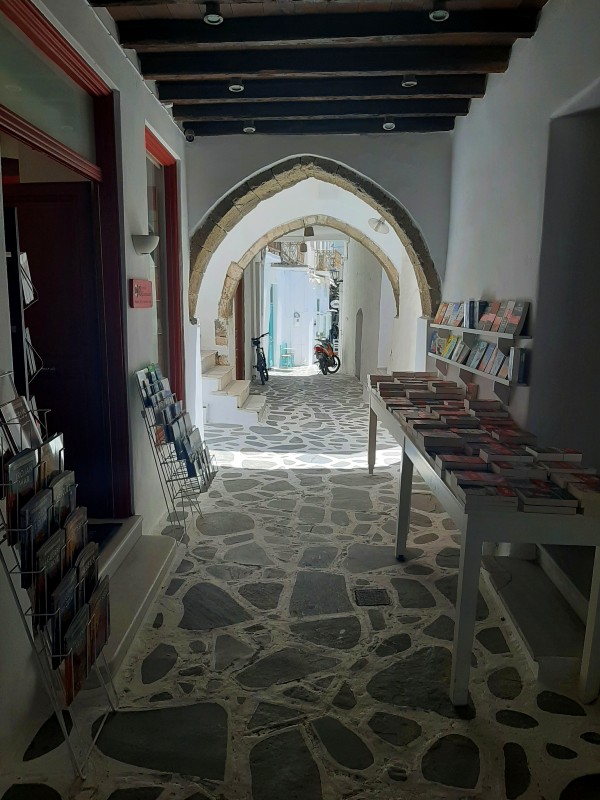

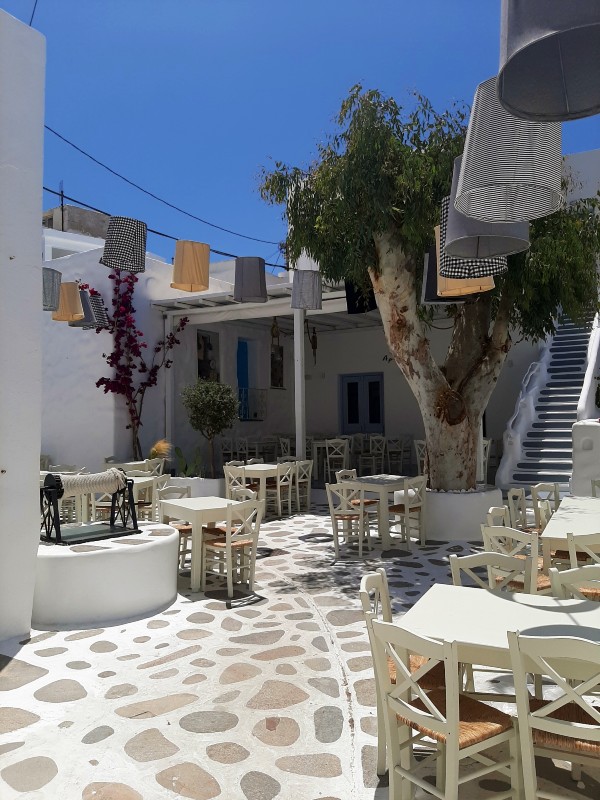
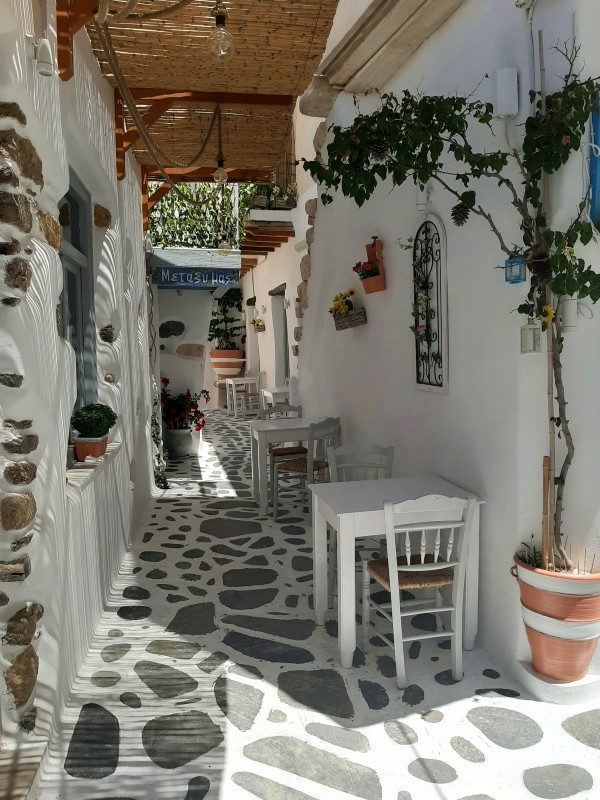



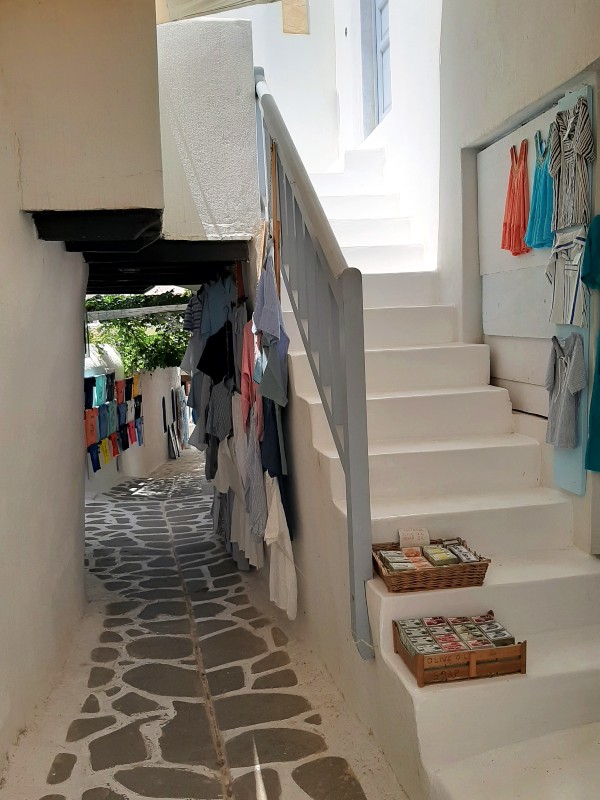
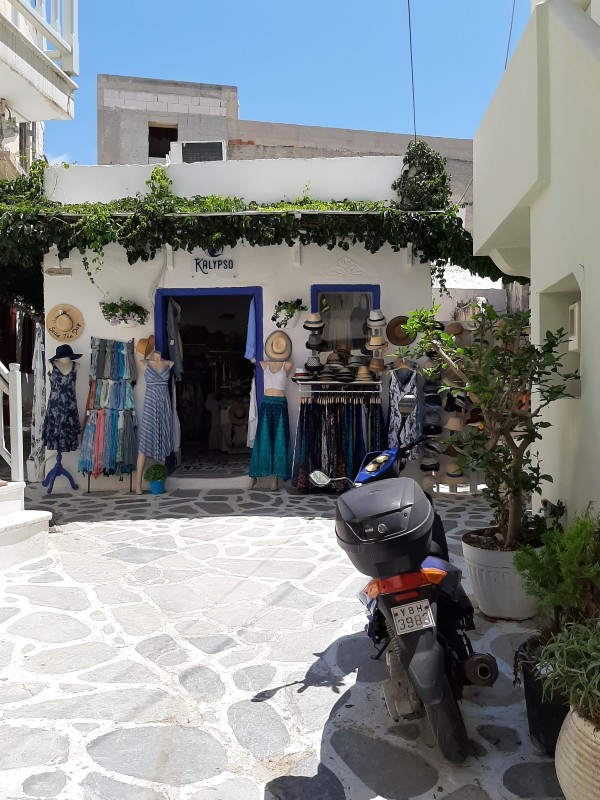
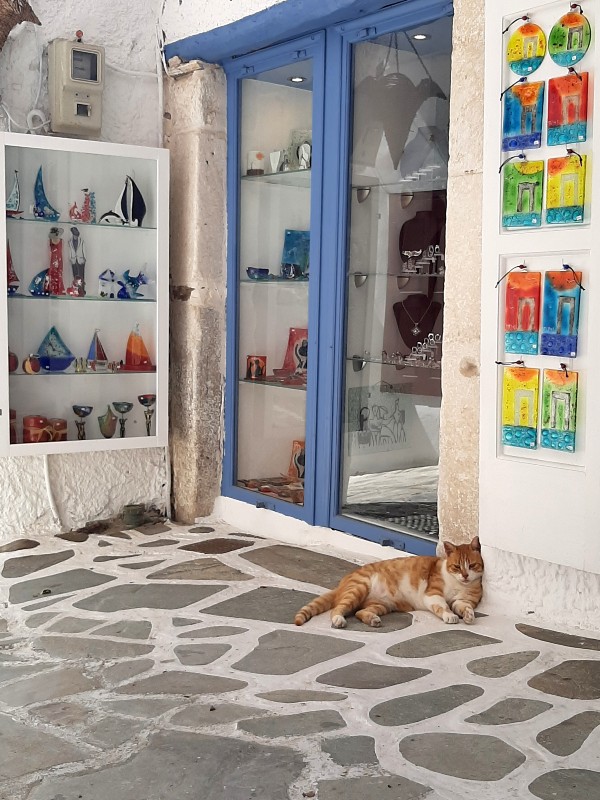
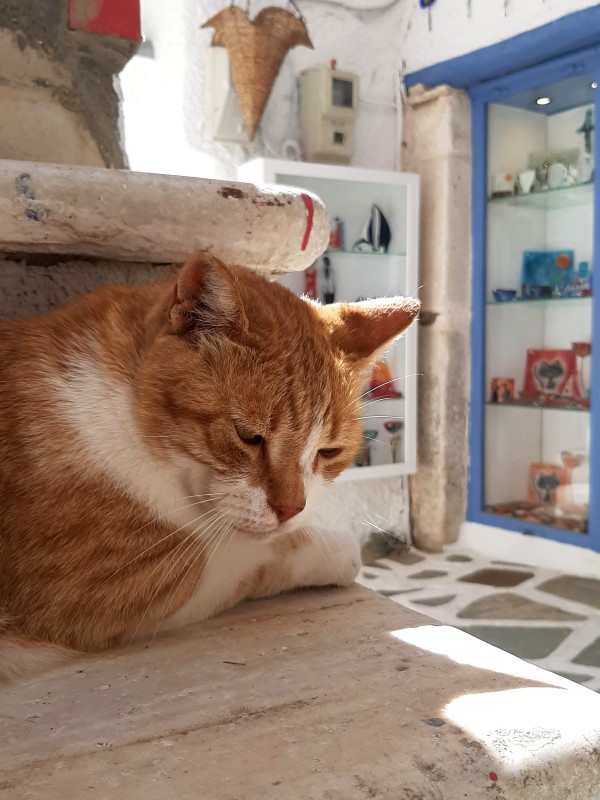

Cats and flowers
After wandering around for a while I ended up in a Bourgos backstreet which was one of the most picturesque streets I’ve ever encountered in Greece (and I’ve seen quite a lot of the country).
With bougainvillea hanging overhead, colourful flowers placed in pots on the walls, cute cats walking around and old men just sitting in front of their front door doing nothing, it was about the most perfect image of Greece you could ever imagine.


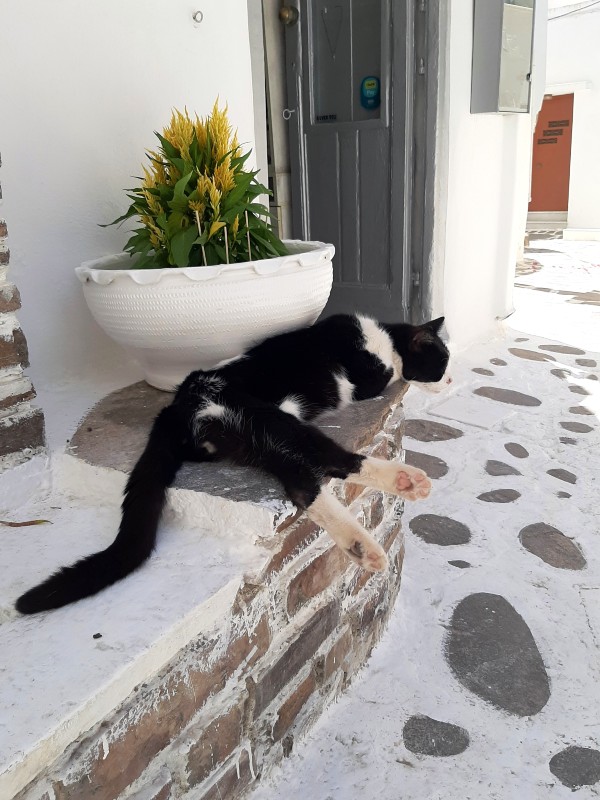


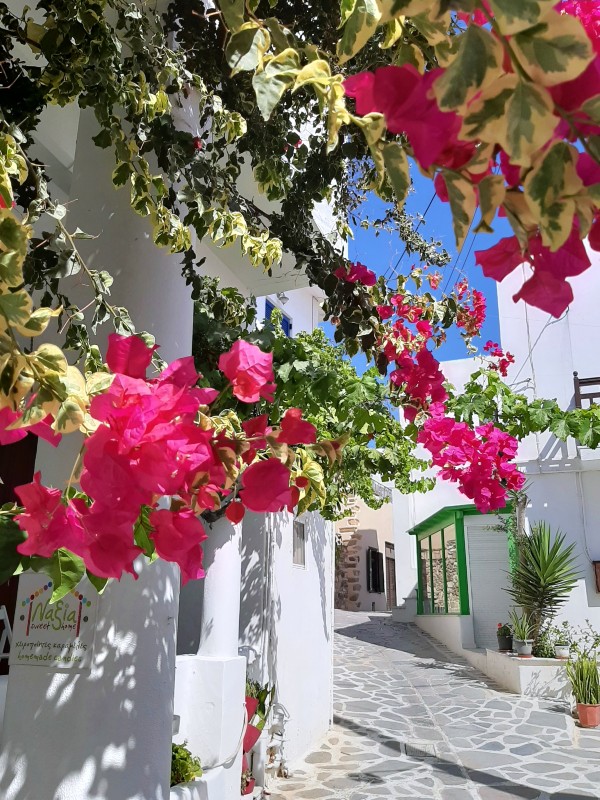
Rest
As I was getting a bit tired from all the walking (and my pale Western European skin a bit reddish from the first bit of holiday sun) I decided it was time to head back to my lovely studio where I was staying for the night.
On the way back, I stopped again for a much-needed freddo espresso and some water, which fortunately in Greece is always served complimentary with your coffee.
Just like the coffee I had before at Honey & Cinnamon, I was again served a small piece of cake from the house.
Although this can be common in Greece and I have no idea if both cafés normally do this, so far the service has been amazing at all places I visited on Naxos.
Although hospitality levels are generally high in Greece and café and taverna owners are usually very welcoming, I couldn’t help but think that people went the extra mile this year, given how dire the summer season looked like due to the complete absence of crowds.
When I visited Naxos before in the shoulder season a few years back, the crowds were much bigger than they were now in July, which normally is prime holiday season.
Nick, the host of my accommodation, even said the bookings for this month were only around 15 percent of what they are in a normal year, with August only looking slightly better.
His estimate would turn out to be shockingly correct, as Greek tourist numbers indeed ended up being down by 85 percent in the month of July.
Although I was tremendously enjoying my time in the country, I certainly felt sorry for all those hardworking people trying to do the best they can in this miserably year.
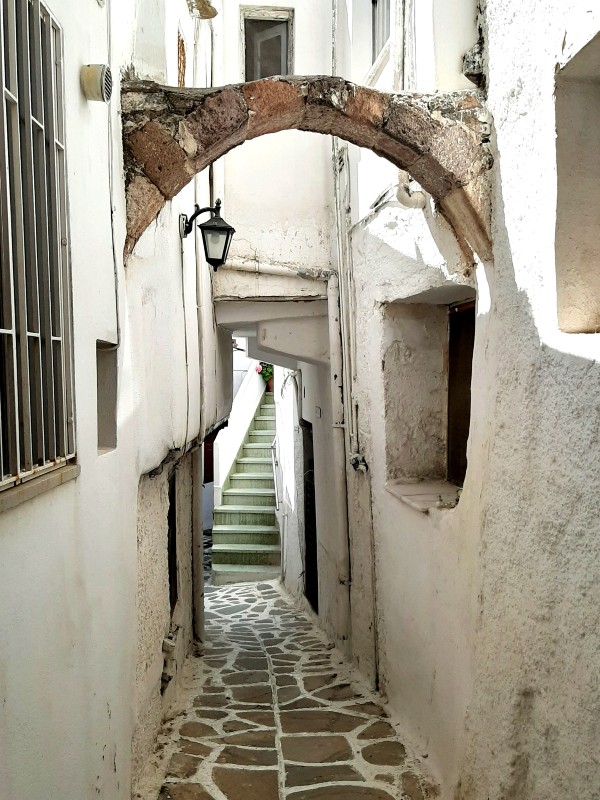
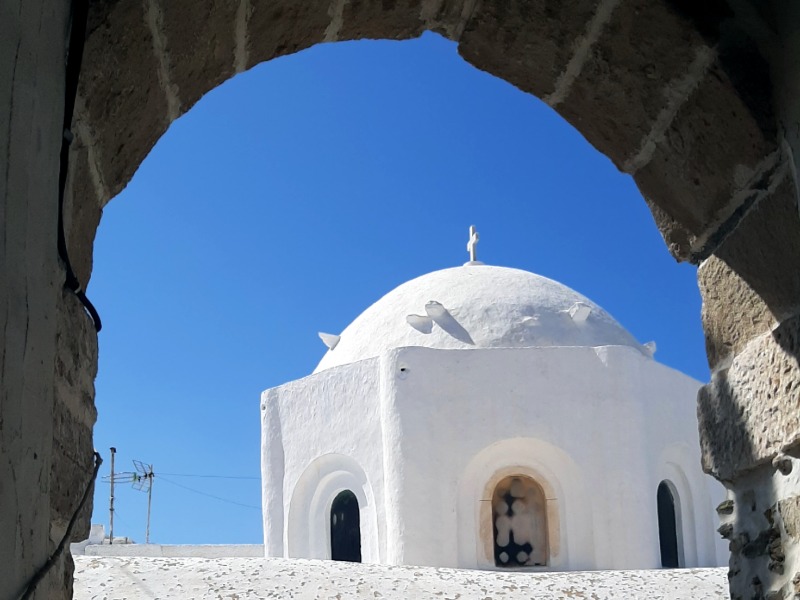
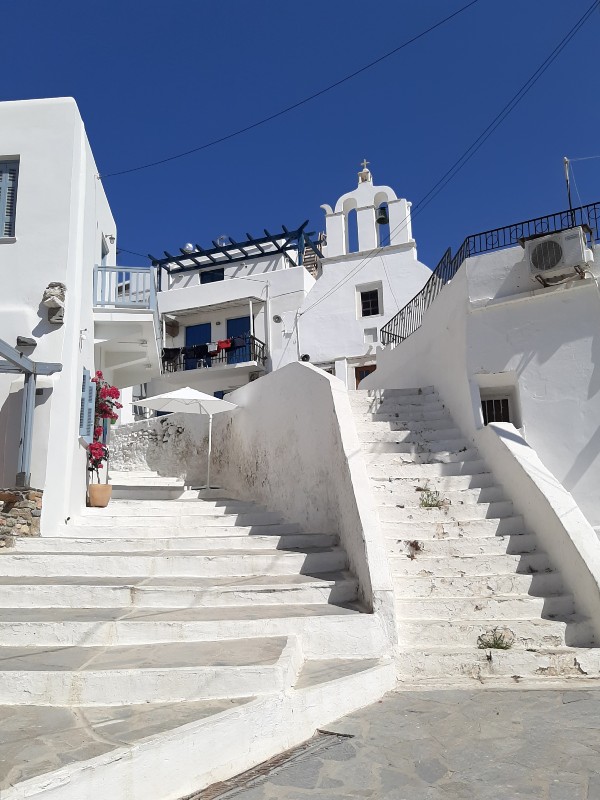
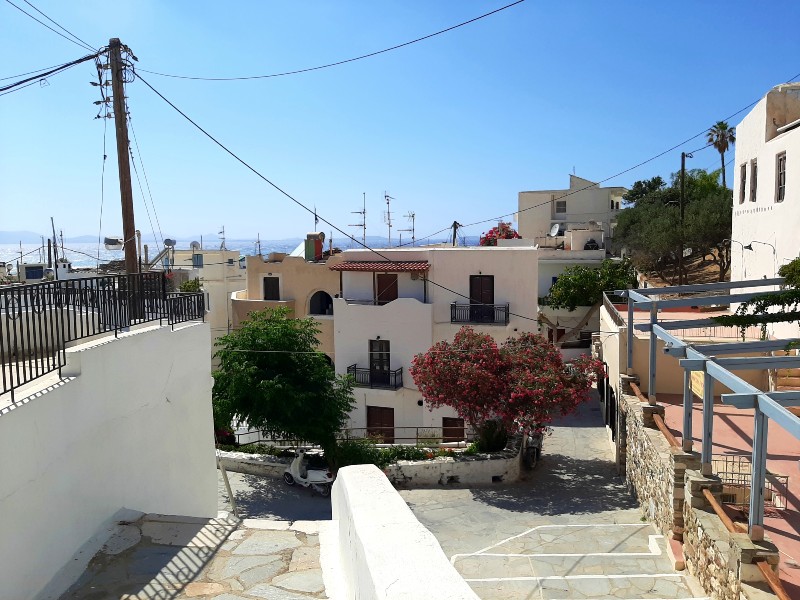
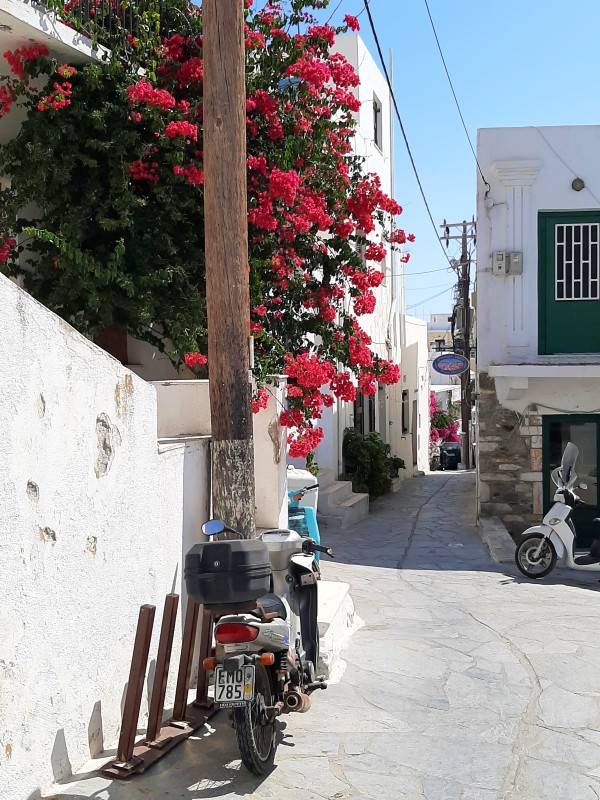
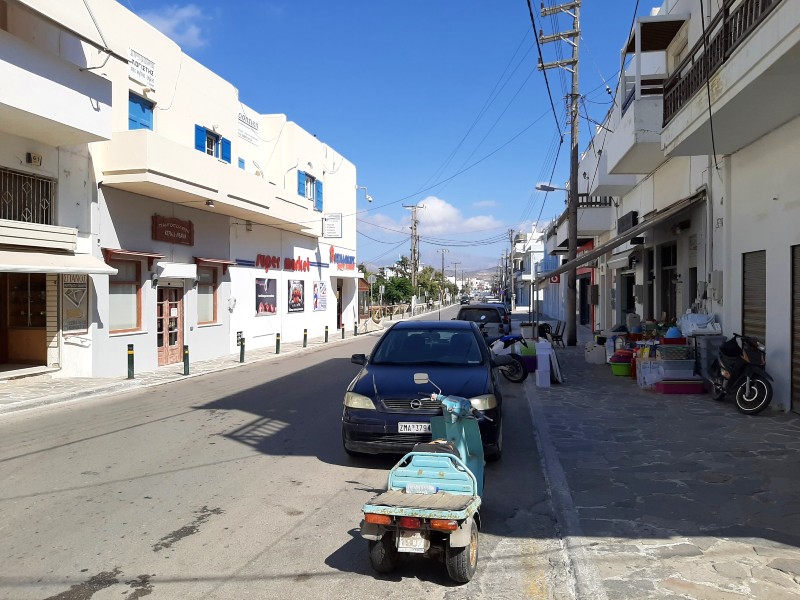
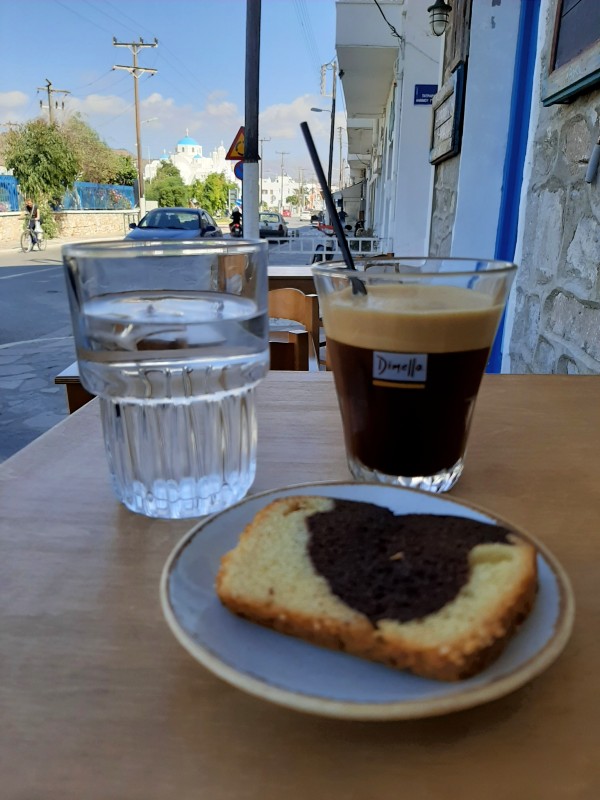
Sunset
After a short rest I headed back to the old town with the goal of finding a good spot to watch the sunset.
I’m a sunset junkie and whenever I am on an island, I always try to find out what the best spot is for sunset watching.
I was contemplating just watching it from the harbour quay or Portara, which would be the safest option given that those spots directly face the open sea towards the west.
In the end I however decided to try to find a spot high up in the Kastro to see whether I could get an unobstructed shot of both Naxos Town and the sea below.
Although I managed to find an OK-ish place in the yard of an abandoned, derelict house, the spot wasn’t as good as I hoped for.
In the end, I still ended up walking downhill towards the sea, being just in time to catch the last glimpses of the setting sun.
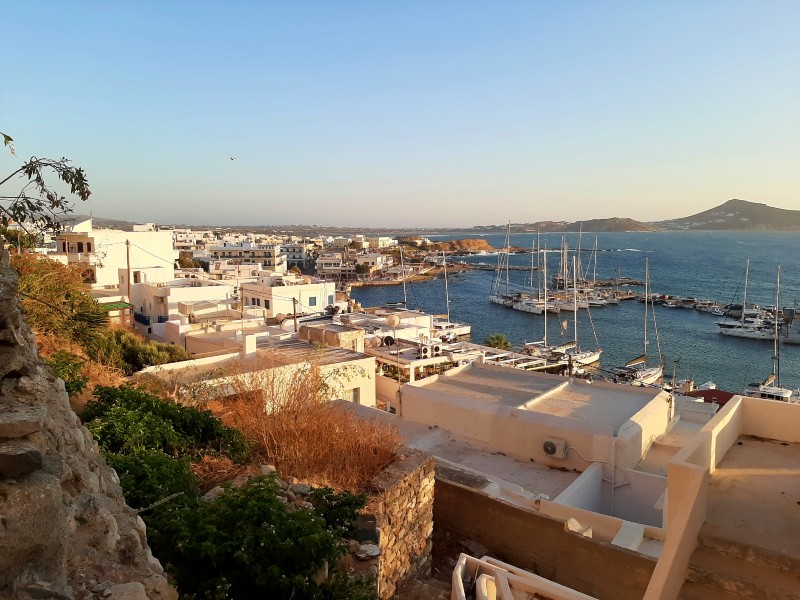

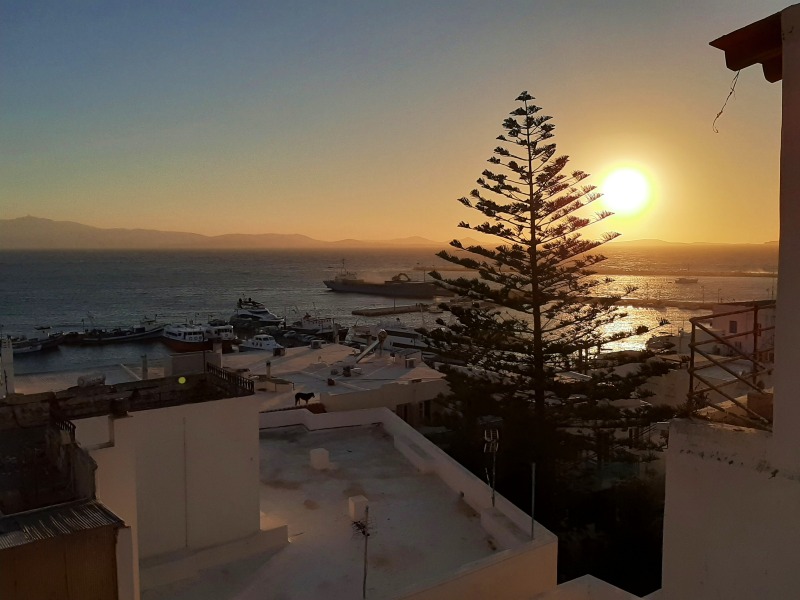

Dinner
For dinner, I went to the Bourgos area to find a nice spot.
It was quite surprising to see people out again on the streets again, as during the day Chora Naxos at times felt like a ghost town.
I found an empty table at an appealing taverna called Metaxi Mas, which was bustling with French tourists.
To eat, I ordered some goat, which is a traditional Naxian dish.
It was served with chips and came with a complimentary appetizer of bread and black olive tapenade.
Together with a Mamos beer, it made for a simple yet very tasty meal.
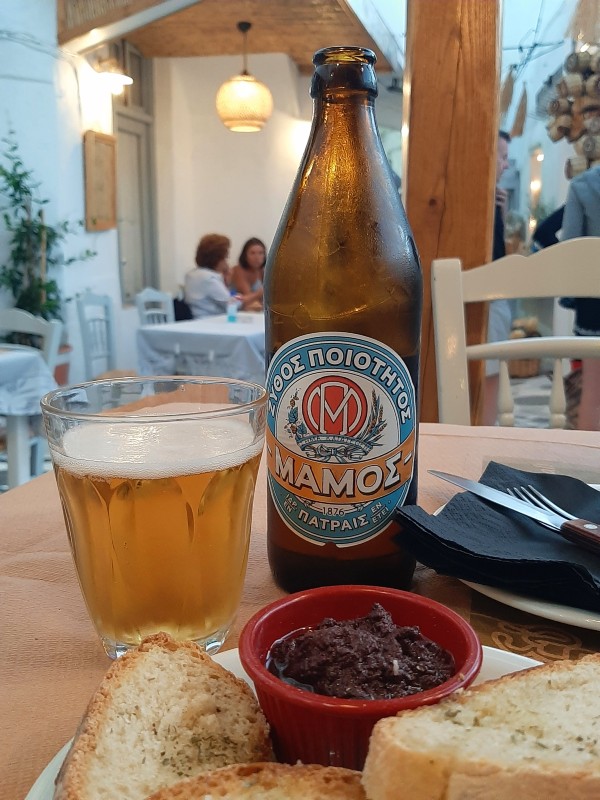
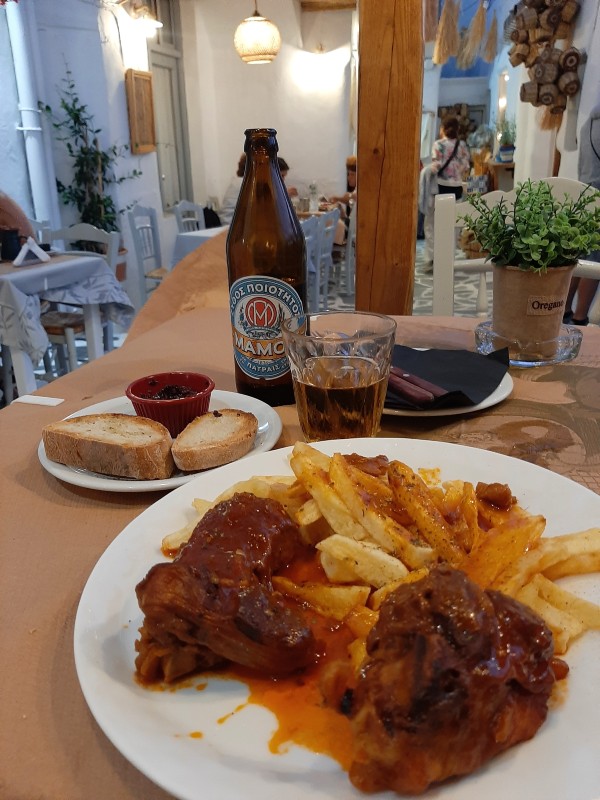
Evening walk
If you visit Naxos Town, you should definitely also take a walk through the old town centre after darkness and not only during daylight hours.
In the evening, there is a lot more buzz in town and all the lights shining on the whitewashed buildings and white-and-grey street stone patterns does create a special atmosphere.
Although there were definitely more people around in the evening than during the day, it did however still feel enormously quiet compared to normal times.
Given that most of the bars and pubs were still completely empty, I just decided to walk back home to my studio.
In the residential area of town where my studio is located, there was however a bit more life, so I decided to join some of the Naxians at a local kafenio (traditional Greek café/bar) for a beer, before returning home for an early night in.
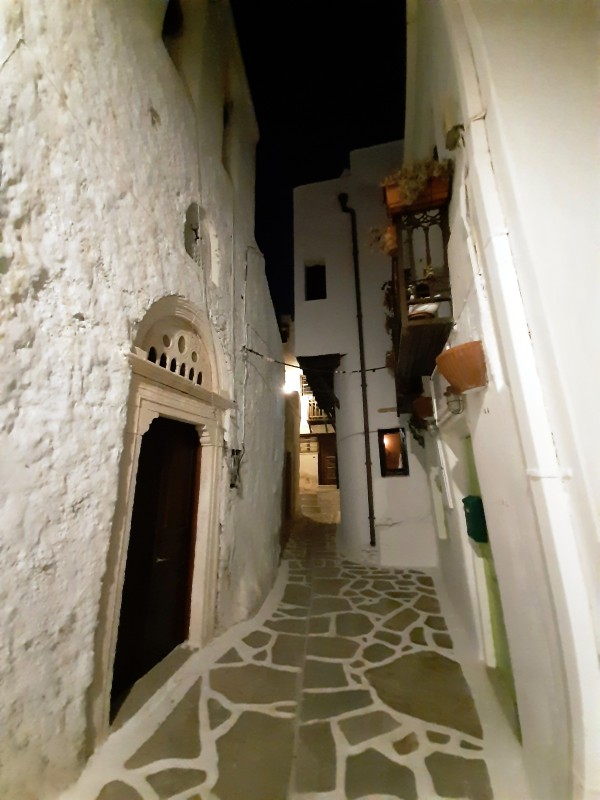
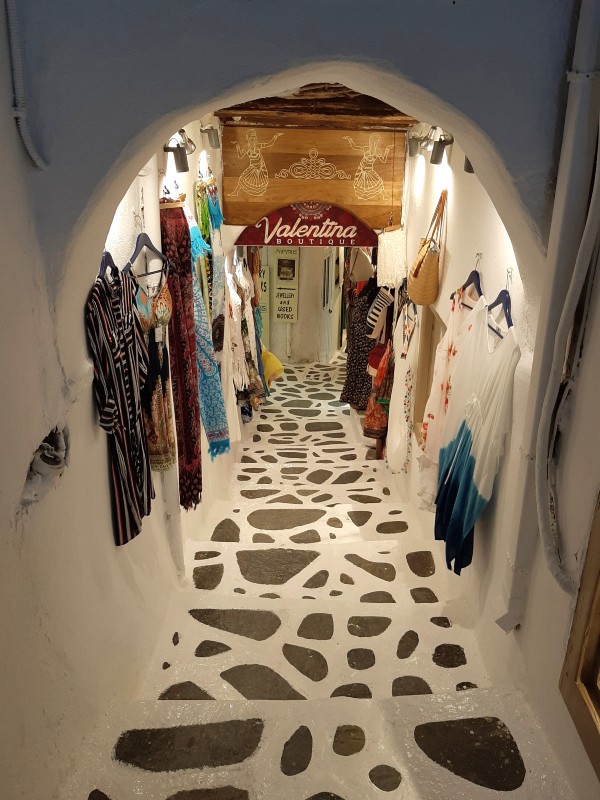
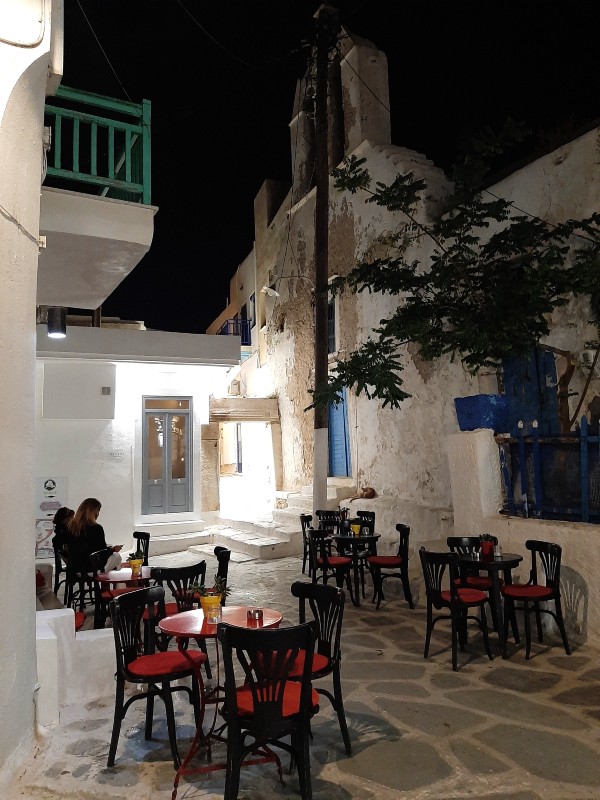

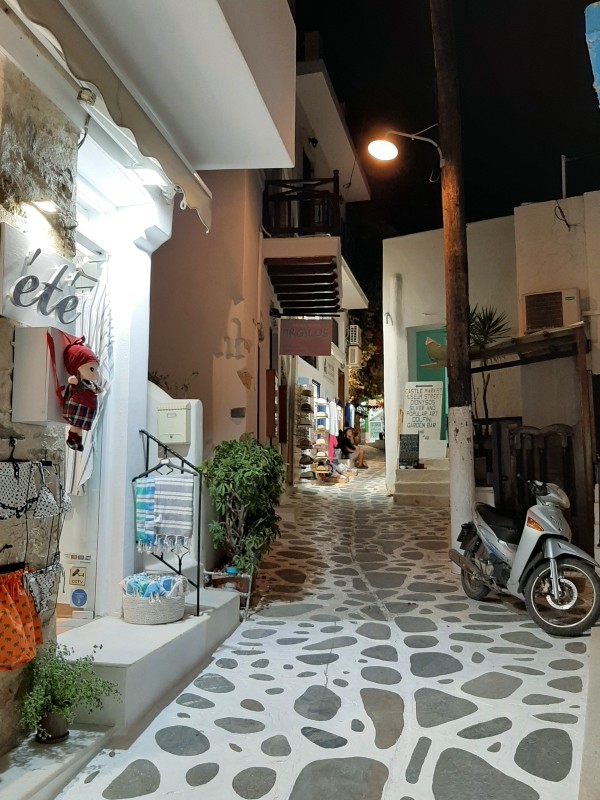
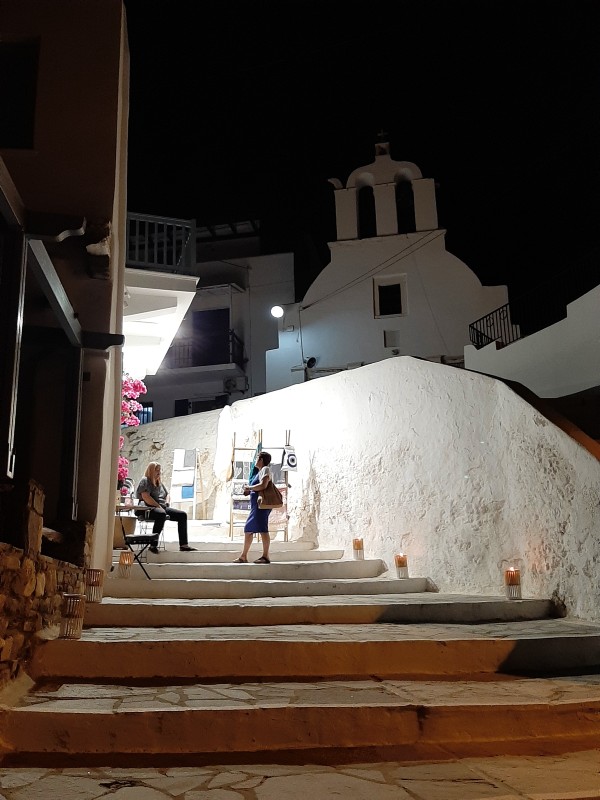
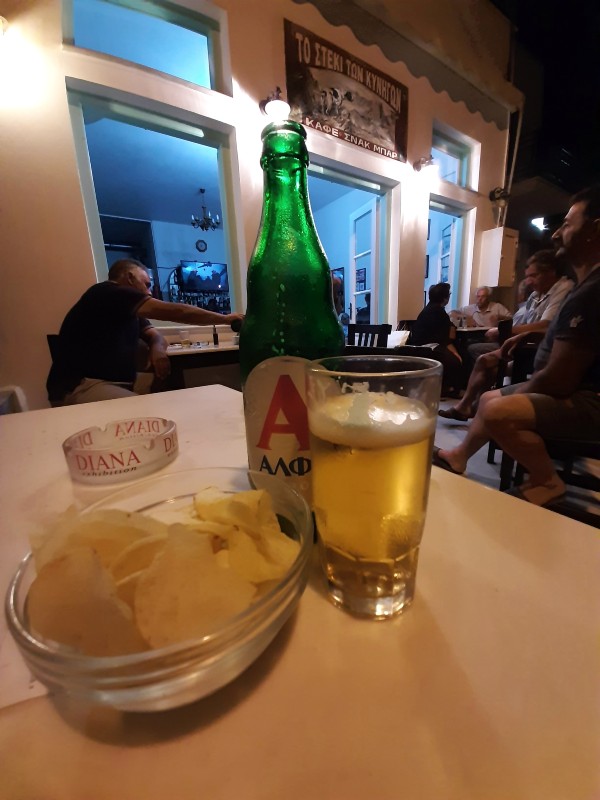
In short
Naxos Town is one of the most beautiful and lively urban centres of all the Cyclades.
The city packs a lot of history and beauty in its cute streets and you can easily find remnants of some of Greece’s main historic eras, whether it’s ancient Greek, Byzantine or Venetian.
Especially when navigating the maze-like streets of the Bourgos and Kastro neighbourhoods you’ll find tons of highly picturesque spots and viewpoints which could easily fit on the brochure of any Greek tourist guide.
Given the size of Naxos Town and the entire island itself, it’s no surprise that you can find a lot of excellent cafés and restaurants.
While other islands in the Cyclades are dominated by tourists, Naxos still manages to combine its local roots with being a beloved tourist destination and thus definitely has a lot of local flavour too.
If you have the time, by all means, stay a week on Naxos and explore all the delights of the island (there are many!).
That said, even if you are short on time or might just pass through Naxos Town having to change ferries, you should definitely try to allocate at least a full day to this lovely city.
Trip report index
This article is part of the ‘A Dodecanese Dream: Summer Island Hopping in Greece‘ trip report, which consists of the following chapters:
1. Back in the Skies – My First International Flight in the Age of Corona
2. Review: Kimon Hotel, Athens, Greece
3. Exploring Plaka: Through the Winding Streets of the Old Town of Athens
4. Climbing up the Acropolis: Visiting Athens’ Most Famous Sight
5. Review: Skyserv Melina Merkouri Lounge Athens Airport
6. Review: Sky Express (ATR 42) Athens to Naxos
7. Review: Studios Zafiri, Naxos Town, Greece
8. Naxos Town: The Gorgeous Historic Heart of the Cyclades (current chapter)
9. Review: Blue Star Ferries Naxos to Astypalea
10. Review: Belvedere Studios, Astypalea Town, Greece
11. Astypalea Town: The Unknown Crown Jewel of the Aegean Sea
12. Astypalea Island Guide: Exploring the Butterfly of the Aegean
13. On a Night Boat in Greece – Astypalea to Kastellorizo With Blue Star Ferries
14. Review: Traditional Apartments Alexandra, Kastellorizo, Greece
15. Kastellorizo: A Look Around Greece’s Easternmost Island
16. Hiking on Kastellorizo: Two Sunset Hikes Detailed
17. Review: Olympic Air Kastellorizo to Rhodes (Dash 8-100)
18. Guide: How to Travel From Rhodes to Halki by Ferry
19. Review: Dorothea Apartments, Halki, Greece
20. Halki Town: Eating, Swimming & Relaxing in Beautiful Emborios
21. A Hike to Horio: Exploring Halki’s Old Abandoned Capital
22. Guide: The Best Beaches on the Island of Halki
23. Review: Hermes Hotel, Rhodes Town, Greece
24. A Visit to the Delightful Old Town of Rhodes
25. Review: Aegean Airlines Domestic Flight Rhodes to Athens
26. End of a Dream Holiday in Greece: One Last Day in Athens

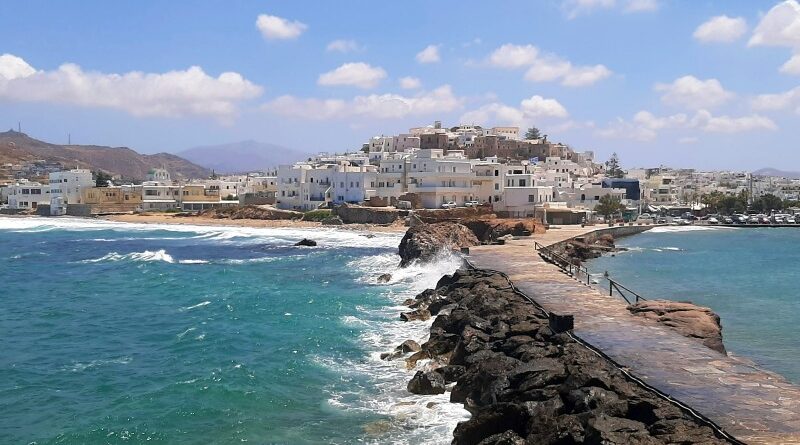
Yet another great review, thank you Koen.
You keep visiting places where I mis-spent my youth many years ago! The only problem with this is you make me want to go back and then there’s competition with all the places I still haven’t been!
Greece is definitely on my travel list for this year but not until October when hopefully things will be somewhere like normal again, I already have a LHR-ATH booking and who knows what will happen when I get there!
Thanks again lhrpete for the nice comment! I don’t know what the other countries are on your travel list, but Greece should be great in October!
I went on a shorter Greek trip last October to Sifnos and Milos and it was fantastic. On Sifnos there wasn’t that much a difference from normal Octobers I’d say – some towns were even quite lively with visiting French tourists! It had just the right trade-off – in the day you have sights and beaches for yourself, in the evening it’s lively enough with a nice vibe to actually enjoy the good taverna life or a glass of wine/beer at the pub.
Milos felt more quiet, but that is because tourism is normally on a much larger scale there. That said, some villages and remote taverns were still full of locals and tourists alike even in October!